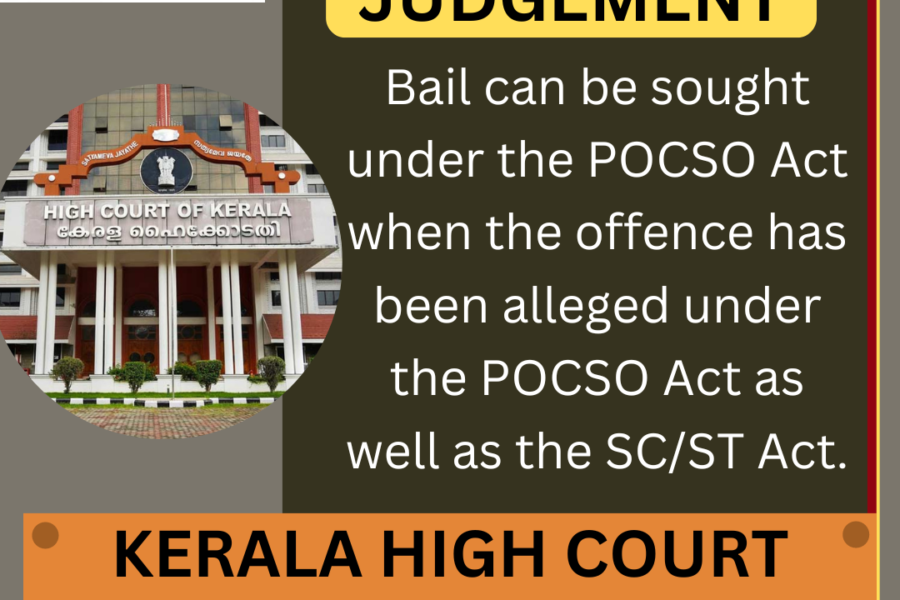Renoj R.S v. State of Kerala
Bail Application No. 6688 of 2022, decided on 26-10-2022
Kerala High Court:
Bechu Kurian Thomas, J. has held that whenever an offence under the POCSO Act is alleged, along with the provisions of the SC/ST Act, the accused is entitled to take recourse to the procedure contemplated under the POCSO Act for bail, as by virtue of Section 31 of the POCSO Act, the provisions of CrPC are made applicable. Therefore, the petitioner was justified in approaching the court regarding the conflict regarding the manner and forum for filing a bail application when offences under the provisions of the Scheduled Castes and Scheduled Tribes (Prevention of Atrocities) Act, 1989 (the “SC/ST Act”) as well as the POCSO Act’s alleged co-commitment to the High Court under CrPC.
Under Section 439 of the Code of Criminal Procedure, 1973 (CrPC), the petitioner has already been granted bail by the court; but, since a legal concern pertaining to a discrepancy between two statutes has arisen, it has been decided to take a closer look at the case. The Registry of the Court objected, arguing that Section 14A of the aforementioned Act only permits an appeal in light of the charges claimed under the SC/ST Act, despite the Court’s conclusion that the bail application was submitted.
The Court noted the decision in K.M. Basheer v. Rajani K.T., 2022 SCC OnLine Ker 4470, which concluded that “a bail application, including that for anticipatory bail, can be filed only before the Special Court designated under the said statute when an offence under the SC/ST Act is alleged.” Furthermore, under Section 14-A of the SC/ST Act, the High Court’s authority in the bail proceeding is limited to appeals. The petitioner is allowed to maintain an application for bail under Section 439 of the CrPC and seek the remedy before the Sessions Court as well as the High Court, the Court said, assuming the POCSO Act’s provisions take precedence.
If the SC/ST Act’s provisions take precedence, on the other hand, an appeal to the High Court under section 14-A of the SC/ST Act will only be possible if a bail application is submitted to the Special Court. Therefore, it appears that there is a discrepancy in how the bail-related sections of the two relevant statutes are applied. After reviewing Sections 20 of the SC/ST Act and 42-A of the POCSO Act, the Court found that both Acts contain provisions that, to the extent of any discrepancy, give the relevant statute precedence over all other provisions of any other statute.
Furthermore, the POCSO Act expressly makes applicable the bail provisions included in the CrPC. The Court observed that the primary discrepancy between the POCSO Act and the SC/ST Act relates to the type of jurisdiction that can be used under the bail-related statutes.
Furthermore, the SC/ST Act expressly excludes the right of an accused person to seek anticipatory bail and only offers an appellate remedy to the High Court in cases involving regular bail. In contrast, the POCSO Act grants the accused person the right to seek bail or anticipatory bail through Section 31 and does not deny them this right. As a result, the High Court’s jurisdiction over bail under the SC/ST Act is appellate, whereas its jurisdiction under the POCSO Act is concurrent and original when read in conjunction with the CrPC.
Furthermore, it was noted that Parliament has not interfered with or nullified the POCSO Act’s overriding impact, even in the wake of the SC/ST Act’s amendment. Therefore, it is clear that the lawmakers intended for the POCSO Act to take precedence above any inconsistency, including the SC/ST Act.
The case of Rinku v. State of U.P., Criminal Misc. Bail Application No. – 17348 of 2018, and Suraj S. Paithankar v. State of Maharashtra, Bail Application No. 817/2020 were cited as well. In these cases, it was decided that “the provisions of the POCSO Act will prevail over the SC/ST Act” and that the accused was entitled to use the POCSO Act’s bail procedure whenever an alleged offence included both the provisions of the SC/ST Act.
Adv. Khanak Sharma

